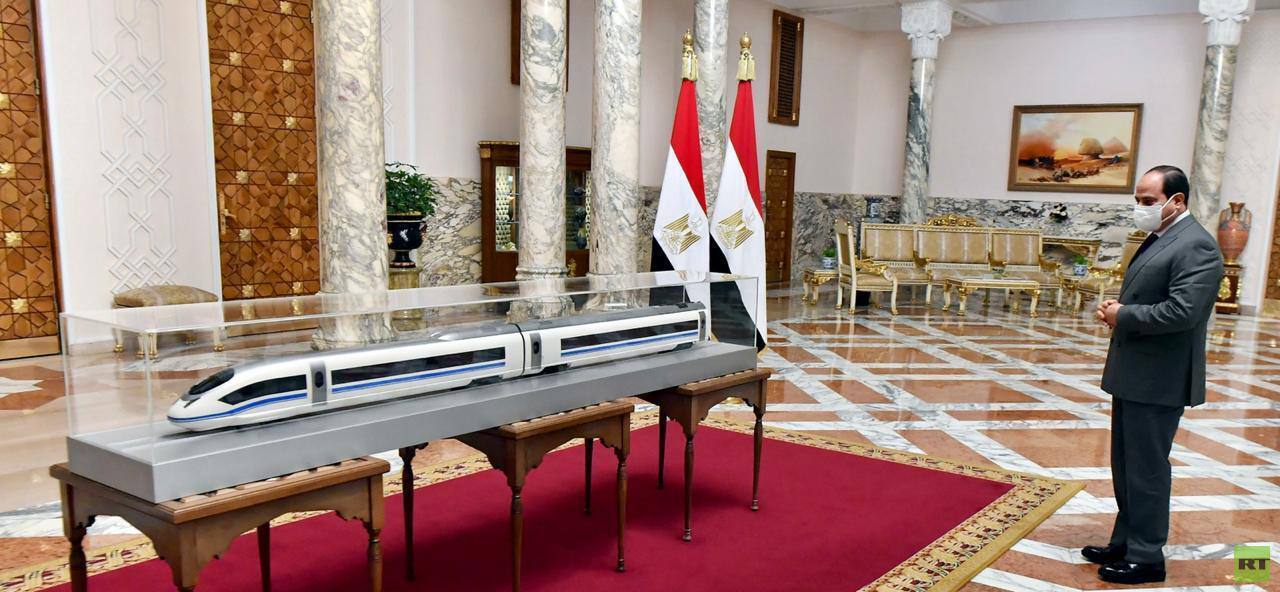In just four months, the cost of building an express electric train in Egypt increased from $3 billion to $9 billion and then finally to $23 billion. Thus, the sequence of events for the train on which the signing of the memorandum of understanding was revealed last Thursday showed an understanding between the Ministry of Transport, represented by the National Tunnels Authority, and the German company Siemens, in the presence of the Egyptian Prime Minister, Mostafa Madbouly.
The train line is scheduled to link Ain Sokhna on the Red Sea coast and the new city of El Alamein on the Mediterranean coast, passing through the Administrative Capital, Sixth of October, and Burj Al Arab in Alexandria. The Egyptians have said that the information and facts were absent, in light of the regime’s policy of lack of transparency. The sequence of events begins on September 4, when the Egyptian Ministry of Transport announced that the Egyptian-Chinese alliance (Samcrete – Arab Organisation for Industrialisation – CCECC – CRCC) had won a tender for the implementation of the express train project (Ain Sokhna – El Alamein) at a total cost estimated at $9 billion.
This came after the liquidation of nine global alliances into two coalitions only, the first being the winning alliance, and the second one being the alliance (IFK – China state – CREC from China – Siemens Germany – France Railways – Orascom from Egypt – the Arab Contractors). However, the Egyptians were surprised, on Thursday, at the announcement of the signing of the memorandum of understanding to implement the project with a total value of $23 billion dollars (equivalent to $360 billion), an increase of about $14 billion over the number announced more than four months ago.
The Egyptian Minister of Transport, Kamel al-Wazir, said, “The agreement came after long negotiations, which ended after a meeting with the Siemens company (which was within the losing alliance for the first time) with President Abdel Fattah Al-Sisi.” During the meeting, the two parties agreed on operating conditions through the old railway system, with specifications that are the highest in the world, without crossings, as is the case in the current railways, according to the minister.
According to an official statement by Siemens Mobility, the memorandum of understanding between the two parties is not yet binding. It is still under negotiation in preparation for the final contract, indicating that the project aims to be more than 1,000 kilometres. However, the contract was made on only 460 kilometres, which is the area between Ain Sokhna and New Alamein, passing through the Administrative Capital, located 45 kilometres (east of Cairo). The strange thing is that the German company has previously indicated that the project will not exceed $3 billion. Not $23 billion, as the Egyptian government announced, which the latter will pay with soft loans from abroad.
According to the German company, Egyptian companies such as Orascom and the Arab Contractors were to carry out contracting work on the project, leaving the tracks, trains, technology, and maintenance to Siemens Mobility. The announcement of the express train project coincides with the decision of the extraordinary general assembly of the Egyptian Iron and Steel Company, one of the Egyptian Ministry of Public Business Sector companies, to finally liquidate the Iron and Steel Company 67 years after the establishment of the company, which is the Iron and Steel Castle in Egypt and the Middle East.
Al-Sisi inaugurated many megaprojects that do not have any impact on the Egyptian citizen, such as the new Suez Canal branch and the new administrative capital. These projects burden the country’s economy and the financial crises it suffers from, especially with the Egyptian regime’s endeavor to implement cosmetic projects that benefit the rich at the expense of the poor. At the beginning of 2017, al-Sisi told the Egyptians, within the activities of the second youth conference in the Aswan governorate, “Be careful that you are too poor. No one told you that you are too poor. We are too poor,” he claimed.
According to observers, the significant increase in poverty rates in Egypt is the result of al-Sisi’s economic policies as he did not place low-income people among his priorities. In the past years, al-Sisi complied with the IMF’s instructions to reduce subsidies, raise the price of fuel and all commodities, and reduce the number of government employees, which led to an increase in the number of poor people.
Egypt has expanded borrowing from abroad through several tools, including the international green bonds that the government listed on the London Stock Exchange at the end of last September with a value of $750 million and international bonds last May with a value of $5 billion. It is noteworthy that Egypt is required to pay foreign liabilities of about $13.94 billion and $12.613 billion during the next two years in a row. Last Monday, the Central Bank of Egypt announced the borrowing of EGP 21 billion (approximately $1.3 billion) by offering treasury bond bills, in coordination with the Ministry of Finance to finance the budget deficit. Foreign debt in Egypt rose until the end of last September to $125.3 billion, compared to about $123.5 billion at the end of last June.





Recent Comments